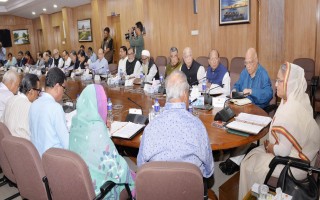Govt approval must for human organ transplant
The cabinet on Monday approved a draft amendment of law requiring all hospitals, excepting those established by the government with specialised units, to obtain government approvals for transplantation of human organs including kidneys, hearts, lungs and eyes.
The draft also proposes lowering the maximum jail term to three years from seven years, but increasing the fine to Tk 10 lakh from Tk 3 lakh for violating the law enacted in 1999.
The health services division placed the draft Transplantation of Human Organs (Amendment) Bill 2017 in the weekly cabinet meeting chaired by prime minister Sheikh Hasina at the Cabinet Division in the secretariat.
‘All hospitals must obtain approvals from the government to transplant human organs. But those set up by the government with specialised units for transplantation of organs would not require such approvals,’ the Cabinet Division’s additional secretary Ashraf Shameem told a press briefing after the meeting.
All hospitals transplanting human organs must apply seeking approvals to provide such medical treatments within 60 days of the enactment of the proposed amendments, he said.
The additional secretary said if a physician was convicted under the law, his/her registration, provided by the Bangladesh Medical and Dental Council, would be cancellable. And the hospital concerned would lose the approval for organ transplantation, he mentioned.
The bill was drafted keeping in view the development in medical science and illegal trade of human organs in the country.
The ‘close relations’ of a donor willing to donate body organs have been redefined widening the list of blood relations that would now include both parental and maternal cousins, grandfathers, grandmothers and grandchildren besides parents, siblings and children, spouses and blood-related uncles and aunts in the existing law, according to the draft.
On June 29, 2015, the cabinet asked the health ministry to propose necessary amendments to the Transplantation of Human Organs Act, 1999, turning down the ministry’s proposal for a fresh enactment to check illegal trade of human organs, mainly kidneys and liver lobes.
The move came after a High Court order delivered in 2011 for framing rules to enforce the Transplantation of Human Organs Act more effectively in keeping with advancement of medical technology.
Organ donation is the donation of biological tissue or an organ of the human body, from a living or dead person to a living recipient, who needs a transplantation.
According to the proposed amendments, no one would be allowed to transplant human organs without the certification of a three-member medical board of the hospital concerned, which would be responsible for identifying the relatives willing to donate an organ.
A professor having experiences in surgery would lead the medical board while the four-member certification board, led by a directorate general of health services officer not below the rank of director, would assist collection and transplantation of organs.
The draft also proposes formation of an 11-member national committee, led by vice-chancellor of Bangabandhu Sheikh Mujib Medical University, for collection of organs from anyone declared ‘brain death’.
A living donor should be between 18 years and 65 years of age. But the provision would not apply in case of donation of eyes and marrows, Ashraf said.
A patient must be between two years and 70 years of age to receive any organs from a donor, he added.
In the name of organ donation, illegal trade of organs has been continuing in the country for more than a decade as the existing law is hardly implemented, according to officials.
Wealthy recipients and brokers trick the poor and illiterate people into selling their organs by making false promises like high prices and jobs and travelling to foreign countries.
The Code of Criminal Procedure, 1898 would apply in investigations, trials, appeals and other related issues of the offences under the amended law.
News Courtesy: www.newagebd.net











